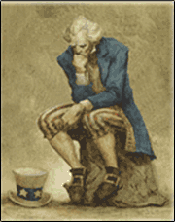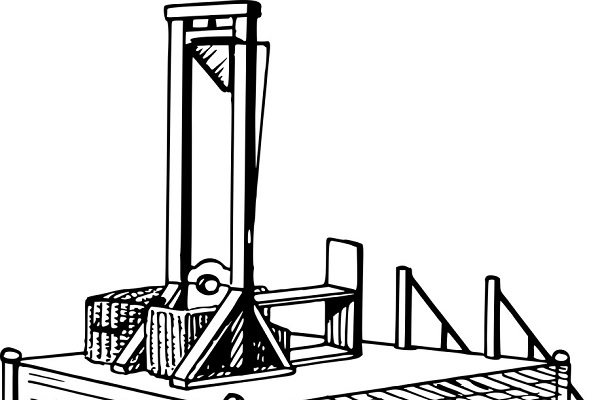
–>
November 21, 2022
Lawyer to revolutionary to tyrant to butcher to victim of the forces he himself had unleashed — that was the arc of the life of Maximillian Robespierre.
‘); googletag.cmd.push(function () { googletag.display(‘div-gpt-ad-1609268089992-0’); }); }
The architect of The Terror that engulfed France from 1792 until 1794, Robespierre may have been the first despot of the mind. Throughout history, kings and emperors and such had raged across the world, killing people for power and land and glory and to obliterate opponents. But Robespierre’s elected dictatorship was the first to systematically kill people in its own territory for not thinking the right way, for not blindly following his lead, for not fully engaging in the mechanisms of their own oppression, and to make them better.
Robespierre was the direct precursor of Stalin, Hitler, Mao, Pol Pot, and too many others — the list is sadly too long — who saw the state as a single self-defined monolith that must, should, and had the absolute right to destroy anything or anyone it perceived as a threat, as being not committed enough to the state itself, and as even being potentially capable of possessing a self-image and self-worth separate from the state — and its leader.
In his view, the Revolution was not only to overthrow the oppression of the past, but to create a new man, a new citizen of public virtue. That process must, by necessity, include terror. He laid this principle out quite clearly in a speech to the National Convention:
‘); googletag.cmd.push(function () { googletag.display(‘div-gpt-ad-1609270365559-0’); }); }
If the spring of popular government in time of peace is virtue, the springs of popular government in revolution are at once virtue and terror. Virtue without terror is fatal; terror without virtue is powerless. Terror is nothing other than justice: prompt, severe, inflexible. It is therefore an emanation of virtue … a consequence of the general principle of democracy applied to our country’s most urgent needs.
Robespierre and his Jacobin faction were the French Revolution’s equivalent of the Bolsheviks in the Russian Revolution, with the Girondins playing the role — and meeting the same bloody end — of the Mensheviks. The difference between the two revolutionary groups came down to a simple argument, with the Jacobins maintaining that free speech and liberty must be suspended so France could win the external (and eventually internal) war it was fighting because, otherwise, there would be no Revolution left to defend, while the Girondins believed that destroying the liberties the Revolution was based on in fact destroyed the Revolution itself.
Some arrests and some trips to the guillotine later, the Jacobins could stop worrying about the Girondins, and Robespierre’s ideals were now unfettered.
Robespierre had a personal “catechism” he followed:
What is our aim?
It is the use of the constitution for the benefit of the people.
‘); googletag.cmd.push(function () { googletag.display(‘div-gpt-ad-1609268078422-0’); }); } if (publir_show_ads) { document.write(“
Who is likely to oppose us?
The rich and the corrupt.
What methods will they employ?
Slander and hypocrisy.
What factors will encourage the use of such means?
The ignorance of the sans-culottes. (The people must therefore be instructed).
What are the obstacles to their enlightenment?
The paid journalists who mislead the people every day by shameless distortions.
What conclusion follows?
That we ought to proscribe these writers as the most dangerous enemies of the country and to circulate an abundance of good literature.
What other obstacles are there to the achievement of freedom?
The war at home and abroad.
By what means can the foreign war be ended?
By placing republican generals at the head of our armies and by punishing those who have betrayed us.
How can we end the civil war?
By punishing traitors and conspirators … and by making a terrible example of all the criminals who have outraged liberty and spilled the blood of patriots.
He concluded this list with a rather chilling (partially edited) codicil:
What other obstacle is there to the enlightenment of the people?
Misery.
When will the people be enlightened?
When (they) will have bread, and when the rich and the government will stop paying for perfidious pens and language in order to deceive (them).
When will their interest be confounded with the one of the people?
NEVER.
In other words, the Revolution can never end. Liberty and free speech can never be restored. The Terror — if the nation is to be transformed — can never stop.
While physical guillotine blades are not falling across the country now, figurative and social ones are as the woke follow Robespierre’s justifications and strategies to change the nature of America.
Never-ending? That’s called “doing the work” now.
Perfidious pens? That’s those who dare question the unthinking bilge spewed from the Capitol, its bureaucracy, and its collaborationist media.
The people must be instructed? That’s the wholesale social/educational upheaval taken place in schools across the country today.
Making terrible examples of those who have outraged liberty? That’s cancel culture, the FBI raiding homes, people getting sentenced to years in prison for trespassing on public property, and the overt criminal targeting of anyone who is perceived as an enemy.
Slander and hypocrisy? That’s the justification for the elimination of dissent on various internet and social media services, the outsourcing of oppression by the government to willing partners.
The ignorance of the sans-culottes (peasants, farmers, the typical middle class)? That’s the “public is too stupid to understand anything” line now heard over and over from our betters.
Circulate an abundance of good literature? That’s the absurd propaganda the public is inundated with every day on COVID, election security, the economy, new cultural “norms,” and just about everything else coming from on high.
Eventually, for Robespierre, there came what we would now call a “tipping point.” He ordered the execution of a very popular former ally, Georges Danton. After establishing the Cult of the Supreme Being to replace the Cult of Reason, he led a public celebration at which he appeared, to many who attended, that he seemed to think he himself was the Supreme Being. He then pushed a new law that would actually expand the Terror but failed to “socialize” the idea among supporters he would need. Then news came that the French army had pushed back invading Austrians, undercutting the external need for Robespierre’s Committee for Public Safety and the Terror itself. Then his enemies and those exhausted and petrified by the Terror shouted him down as he tried to give a speech to the National Convention, a heretofore unheard-of act. Days later, he was arrested and shortly thereafter guillotined — and the entire process had taken less than two months.
The dam had broken, the people woke up from their coma of fear, the Terror subsided, and Robespierre was no more.
The end was sparked by a collective decision — a unplanned change of mood that swept through the Convention and Paris — a general realization that the people didn’t have to tolerate oppression anymore — that, in a sense, if you ignored Robespierre except to mock him, the Terror might just go away.
And it did.
Thomas Buckley is the former mayor of Lake Elsinore, Cal. and a former newspaper reporter. He is currently the operator of a small communications and planning consultancy and can be reached directly at [email protected]. You can read more of his work at https://thomas699.substack.com.

Image via Pixabay.
<!– if(page_width_onload <= 479) { document.write("
“); googletag.cmd.push(function() { googletag.display(‘div-gpt-ad-1345489840937-4’); }); } –> If you experience technical problems, please write to [email protected]
FOLLOW US ON
<!–
–>
<!– _qoptions={ qacct:”p-9bKF-NgTuSFM6″ }; ![]() –> <!—-> <!– var addthis_share = { email_template: “new_template” } –>
–> <!—-> <!– var addthis_share = { email_template: “new_template” } –>






